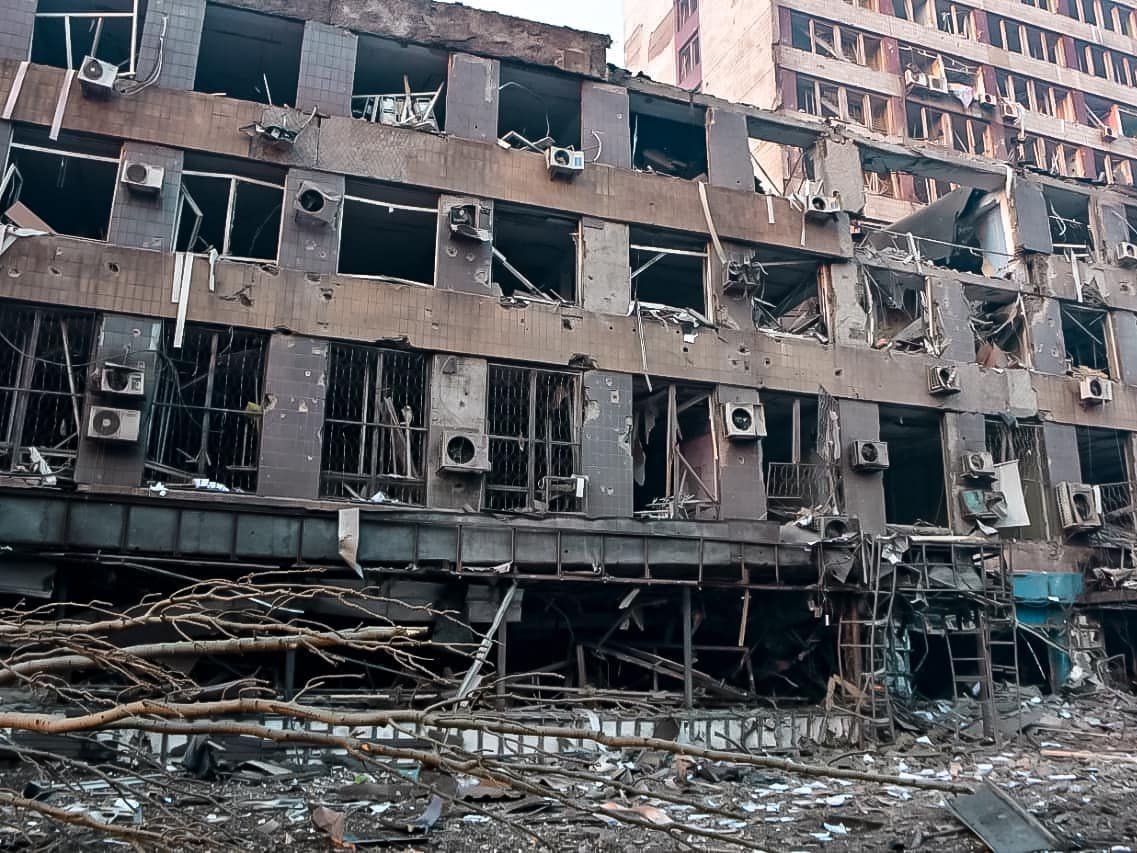From State Repression to a Warzone: How Pamiris have Ended up on the Frontline in Ukraine
The lure of work in Ukraine’s war-torn territory has proven difficult to resist for Central Asian labor migrants, and Russian companies have taken notice. Despite the inherent dangers of working in an active conflict zone, opportunities in Ukraine have proven both reliable and lucrative. Embattled ethnic minorities like Tajikistan’s Pamiris are especially vulnerable due to government attempts to stifle their integration within the wider economy at home.
“It was a really difficult decision to leave everything behind, but I knew that if I didn’t, I would be arrested, and who knows what would have happened to me,” Rashid, a Pamiri labor migrant who worked in Mariupol until December 2022 told us.
A considerable population of labor migrants from Tajikistan’s Pamir region are currently involved in reconstruction work in Russian-occupied Ukrainian territory. The Pamirs have been undergoing a severe crackdown by Tajikistan’s security services which have crushed dozens of NGOs and left the region starved of funding for its 300,000 residents.
According to Rashid, there are now 300 Pamiri labor migrants working for Russian construction firms across Mariupol, a city that was nearly destroyed by Russian forces last spring and is now under its military occupation. Since the reconstruction of Mariupol is of high priority for the Russian government to win over the people of the occupied areas of Ukraine, the workers’ presence helps fulfill a crucial political objective.
When peaceful protests erupted in Khorog and Vamar in November 2021, the Tajik authorities responded with brute force. Soon after the crackdowns, the security forces began tracking down anyone who had dared to attend those demonstrations. This resulted in a wave of arrests, torture, looting, kidnapping, extrajudicial executions, and property confiscation that swept through the Pamiri community. By July 2022, more than 700 Pamiris found themselves on the wrong side of the law, with at least 40 civilians killed.
Rashid’s mother was among the many victims of this repression. On May 29, military forces reportedly looted and burned down her outlet in a local shopping center. Rashid, being the only able-bodied person in the family, had to find work to support his mother as the sole breadwinner. Many Pamiri families are now in need of food, basic necessities, heat, and, for some, housing.
In late October, Rashid found a job announcement on his social network “Vkontakte.” The agency was hiring people for reconstruction work in Mariupol, and they were offering work on a rotational basis from 30 to 90 days with a salary of 80 to 250,000 rubles. “I needed to provide for my mother, and this was a chance to make some real money,” he says.
Russian companies are leveraging social media platforms, like Telegram groups, and relying on word-of-mouth recommendations from fellow Central Asian workers to advertise jobs to an ever-growing pool of potential employees. While jobs in Russia require extensive paperwork and permits, work in Ukraine only requires a passport, making it a tantalizing prospect for those seeking financial stability.
The conditions are far from what is often advertised. After arriving in Mariupol by bus from Moscow, Rashid quickly noted that life in the work camp “reminded [him] of a prison.” After coming down with an illness he decided to quit his job and move to Moscow but received only half of the wages he had earned for doing so.
Many other Tajik and Central Asian workers are being swindled out of their earnings by unscrupulous employers. But for many like Rashid, returning home is simply not an option. “I’d rather go to Mariupol again than go back to Tajikistan,” he stated firmly.
But the risks remain grave. Rashid reported that many of his former colleagues, including Pamiris with whom he had been in touch until recently, were relocated from Mariupol to an unknown location as of April 7 2023, and he has not been in contact with them since then. He believes they were sent to the frontlines to dig fortifications in preparation for Ukraine’s anticipated counterassault.
Other Pamiris have been forced to the frontlines due to changing circumstances in Russia. Zubayda and Alim, a married couple from the Pamirs, were among the thousands laid off when Western companies closed their operations in Russia following the invasion of Ukraine. “We were left without a job and without any means of survival,” Alim says. Since March 2022, they have been barely making ends meet by taking up temporary jobs here and there. But like Rashid, returning to Tajikistan is simply not a viable option amid mass repression in their homeland.
According to the UN Special Rapporteur, the Tajik State Committee on National Security summoned heads of 128 local NGOs to a meeting in GBAO, where they were coerced or persuaded to “voluntarily self-liquidate.” Over 30 NGOs, including those working with children, suspended their activities, and more than 10 NGOs have self-liquidated under pressure. These organizations had been a vital lifeline for much of Pamiri society.
“We don’t know what to do, we are so lost,” Zubayda said. “We had to pay for our apartment and our daughter’s kindergarten. We also have family back in Tajikistan who rely on us for support.”
The couple is also grappling with a moral dilemma. “We never supported Putin’s idea of invading Ukraine,” Zubayda said. “We don’t want to be seen as supporting an aggressive policy that violates international law.” But the decision to go to Ukraine remains a difficult one. They know the risks, but they also know they can’t afford to do nothing. It’s a choice that many Central Asian labor migrants are forced to make in the face of economic hardship and political turmoil.
Alim, who had narrowly escaped his cousin’s attempts to lure him to Mariupol, also shared a disturbing update. He revealed that his cousin had vanished without a trace since the beginning of April. Alim fears that his cousin had either been drafted to fight on the front-lines against the Ukrainians or had taken up the job of retrieving dead Russian soldiers from the battlefields. Shockingly, some Central Asian migrants were rumored to be involved in this dangerous task, risking their lives for a decent paycheck.
Many Tajik nationals have already been sent to fight in the Russian war in Ukraine, with the number of casualties reportedly rising. However, there has been no reaction from the Tajik government against the use of its citizens in the war. This is because almost all of them have dual citizenship with Russia. In contrast, the National Security Committee (KNB) of Kazakhstan is investigating ten criminal cases related to the participation of Kazakhs in hostilities in Ukraine. According to Kazakh law, participating in foreign armed conflicts can result in imprisonment for five to ten years.
Recent reports indicate that Tajik and Pamiri migrants in Russia are facing increasing pressure to actively participate in the war in Ukraine. Individuals with Russian citizenship are reportedly at risk of losing it if they do not enlist, while those seeking citizenship may also be mobilized for the war effort. Additionally, there are reports that labor migrants from Tajikistan and other Central Asian republics seeking work permits in Russia are being offered booklets advertising military service.
According to the Sirena telegram channel, the Sakharov Migration Center near Moscow is recruiting migrants for the war effort by promising them Russian citizenship. On April 4, a second wave of agitation for migrants began at the center, with employees being forced to offer service under contract in the Russian army to migrants who apply for work patents. Those who agree to the offer are required to sign the contract on the spot. Moreover, the administration of the Odintsovo district of Moscow Oblast has been actively campaigning to attract volunteers to the armed forces, including foreign nationals from Tajikistan and Uzbekistan, by issuing information booklets.
The escalating repression of Pamiris has pushed some people to the front lines of the Ukrainian conflict. Central Asian labor migrants are drawn to the opportunities in Ukraine’s war-torn territory, exploited by Russian companies. However, working in an active conflict zone comes with significant risks.
The limited participation of Pamiris in the domestic economy as a result of government policies exacerbates their vulnerability. In order to further Russia’s political goals, a large number of Pamiri labor migrants are currently working on reconstruction projects in Russian-occupied regions of Ukraine. Families in the Pamiri community are in desperate need due to repression, and some are being forced to look for work abroad on the basis of false promises.
The ongoing repression in Tajikistan makes going back home impossible. Rashid and other Pamiri labor migrants struggle morally as they try to balance opposing aggressive policies with trying to survive economically. Tajik citizens, including migrants from Central Asia, are engaged in hazardous conflict-related tasks. Migrants from Tajikistan and the Pamir region living in Russia are under increasing pressure to participate or risk losing their citizenship.
The situation draws attention to the plight of vulnerable communities and the interconnectedness of geopolitical events. Rashid, Zubayda, Alim, and others serve as examples of the challenging decisions that migrants from Central Asia had to make while enduring hardship, repression, and the dangers of war. The urgent need to pay attention to the rights and welfare of marginalized communities impacted by conflict is highlighted by this.
Solim Nazarov is an ethnic Pamiri from Khorog. He is pursuing a PhD in a Western country. As a dedicated member of civil society, his activism has landed him on the wanted lists of both Tajik and Russian special forces. Seeking refuge, he is now applying for refugee status in a Western country.
Suzanne Levi-Sanchez is a visiting scholar at Harvard University’s Davis Center for Russian and Eurasian Studies and a retired (tenured) Associate Professor of National Security Affairs Department at the U.S. Naval War College. She is the author of a number of publications including: The Afghan-Central Asia Borderlands: The State and Local Leaders, Routledge (2017); Bridging State and Civil Society: Informal Organizations in Tajik/Afghan Badakhshan, University of Michigan Press (2021); and Fieldwork as Craft: A Practical Guide to Doing Research in the Real World, Rowman and Littlefield International (Forthcoming, 2023).




